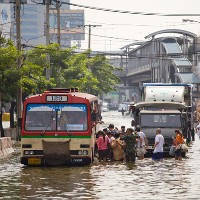Community flood resilience
A foundational White Paper shows how the resilience perspective can help operationalize disaster risk management, by tackling the systemic problems that hamper conventional approaches — critically by embedding disaster policy within a holistic approach to development. In the White Paper, RPV elaborated a broad definition of disaster resilience, as “The ability of a system, community or society to pursue its social, ecological, and economic development and growth objectives, while managing its disaster risk over time in a mutually reinforcing way” ([1] p.7).
The key relationship between socioeconomic development and natural disasters in designing policies for disaster resilience was also elaborated [2]. The researchers identify hard-to-quantify yet critical factors, environmental conditions and social vulnerabilities, as compounding disaster-management-related challenges. These include haphazard development, weak institutions, lack of social safety nets, and short-termism of decision-making practices.
In a subsequent contribution to the Alliance, RPV produced a comprehensive review of the quantitative evidence on the costs and benefits of flood mitigation projects. In the flood risk reduction investments reviewed, this showed that investments largely paid off [3]. Based on these inputs, discussion of the opportunities and challenges of using (novel) risk-based cost-benefit analyses (CBA) for flood resilience interventions in multiple global contexts, including India, Indonesia and New York, have taken place. The review [3] also gives an overview with examples of other decision-support tools, including cost-effectiveness analysis in the Caribbean, multi-criteria analysis in Nepal, and robust decision making in Vietnam.
The Flood Resilience Alliance project received the UN’s Momentum for Change Lighthouse Activity award at the COP20 climate summit in Lima, Peru, created to shine light on the best examples of climate solutions to inspire increased global climate action.
References
[1] Keating A, Mechler R, Mochizuki J, Kunreuther H, Bayer J, Hanger S, McCallum I, See L, Williges K, Hochrainer-Stigler S, Egan C et al. (2014). Operationalizing Resilience Against Natural Disaster Risk: Opportunities, Barriers, and a Way Forward. White Paper, Zurich Flood Resilience Alliance.
[2] Mochizuki J, Mechler R, Hochrainer-Stigler S, Keating A, Williges, K (2014). Revisiting the “disaster and development’ debate” – Toward a broader understanding of macroeconomic risk and resilience. Climate Risk Management (3), 39-54.
[3] Mechler R, Czajkowski J, Kunreuther H, Michel-Kerjan E, Botzen W, Keating A, McQuistan C, Cooper N, O'Donnell I (2014). Making Communities More Flood Resilient: The Role of Cost Benefit Analysis and Other Decision-support Tools in Disaster Risk Reduction, Issue Brief, Zurich Flood Resilience Alliance, Zurich Insurance Company, Zurich, Switzerland.
Collaborators
Wharton School of the University of Pennsylvania, USA
Zurich Insurance Group, Switzerland
International Federation of Red Cross and Red Crescent Societies (IFRC)
Practical Action, UK

Research program
Options: Bouncing forward


